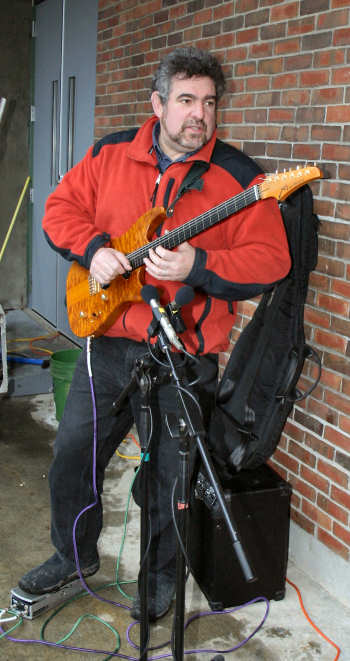 |
|
| Paul Hoskin | Larry Polansky |
Recently relocated to Santa Cruz, composer/guitarist Larry Polansky presents recent work, including the premiere of “Approaching the Azimuth” for solo clarinet written for Matt Ingalls. The program also includes works for solo guitar, a work for solo saxophone, and new structured and free improvisations with sfSound.
From Seattle, improvisor Paul Hoskin performs a solo on the always-fascinating contrabass clarinetist and joins Polansky and sfSound in free improvisations.
Performers include:
Larry Polansky, electric guitar
Paul Hoskin, contrabass clarinet
Monica Scott, cello
Brendan Lai-Tong, trombone
Benjamin Kreith, violin
John Ingle, saxophone
Matt Ingalls, clarinet
Tom Dambly, trumpet
Kyle Bruckmann, oboe
LARRY POLANSKY (b. 1954) is a composer, theorist, teacher, writer, performer, programmer, editor and publisher. He lives in Santa Cruz, California, teaching at UC Santa Cruz. He is also the Emeritus Strauss Professor of Music at Dartmouth College, and co-director and co-founder of Frog Peak Music.
His five solo CDs are available on New World Records, Artifact, and Cold Blue, and his music is widely anthologized on many other labels. His own works are performed frequently around the world. From 1980-90 he worked at the Mills Center for Contemporary Music, where he was one of the co-authors (with Phil Burk and David Rosenboom) of the computer music language HMSL, and a contributor to the widely-used program SoundHack (by Tom Erbe).
His articles are published widely in journals such as Perspectives of New Music, the Journal of Music Theory, the Computer Music Journal, the Musical Quarterly, Leonardo and the Leonardo Music Journal (of which he was the founding editor), as well as many other publications. He is the editor of around 20 the scores of Johanna Magdalena Beyer, as well as scores by Ruth Crawford Seeger and others. In 2004, at the request of Crawford Seeger’s estate, he completed and edited her major monograph The Music of American Folk Song (published by the University of Rochester Press). His writings on American music include works on James Tenney, Crawford Seeger, Lou Harrison, Beyer, and many others. He is also the co-author of Music and Computers, a web-text published by Key Publications.
He is the recipient a number of prizes, commissions, and awards, including Guggenheim, Fullbright, and Mellon New Directions Fellowships, as well as the inaugural recipient (with David Behrman) of the Henry Cowell Award from the American Music Center. As a performer, primarily as a guitarist and mandolinist, he has premiered and recorded a number of important contemporary works, by Christian Wolff, James Tenney, Lou Harrison, Lois V Vierk, Ron Nagorcka, Daniel Goode, David Mahler, and many others. He has been a member of many contemporary music ensembles, including serving as the curator for the Downtown Ensemble for a number of years, and as one-third of Trio (with Kui Dong and Christian Wolff) for over a decade.
In 2010, he wrote the score for Stacey Steers’ Night Hunter, an experimental animation which was chosen for the Telluride, Sundance, Rotterdam, and other film festivals, and selected for the New York New Films/New Directors festival at Lincoln Center. Currently he is working on an edition of James Tenney’s collected theoretical writings, a series of articles about poetry and performance in American Sign Language.
PAUL HOSKIN began playing contrabass clarinet in the summer of 1985. Utterly self-taught, his reed playing life started in the fall of 1980—c melody saxophone, then clarinet, and the bass clarinet exclusively by the spring of 1981. Baritone saxophone added in the spring of 1984. Hoskin performs (and performed) extensively throughout the United States and Europe. Paul’s solo oeuvre is initiated in Seattle June 1986. The fall of 1986 finds himself in Eastern Europe—seven solo performances in twelve days. As solo language develops, Hoskin begins the extended contrabass clarinet work. Ninety minutes continuosly (a switch of technology commands its current eighty minute form). The growth and definition of his solo work is part and parcel of the decade of music life in New York City (1986-1995). Three different ensembles (The Same, Trigger, Dierker/Meehan/Hoskin) provided Hoskin with musics of many sorts. Paul’s life as an organizer for an improvised music community is also shaped. Seattle is returned to in 1996. And, solo language, multiple creative ensemble work, endless ad hoc meetings are resuscitated. Different people, different coast. A brief stay in Astoria, Oregon (2006-2009) reinvigorated the organizer chunk of his work. And, fortunately, the Oregon chapter managed to put Paul in touch with the Bay Area creative music world.